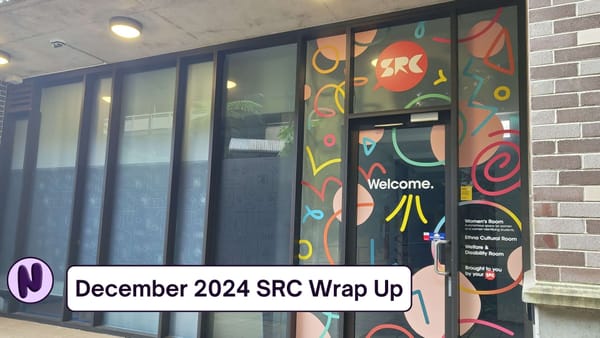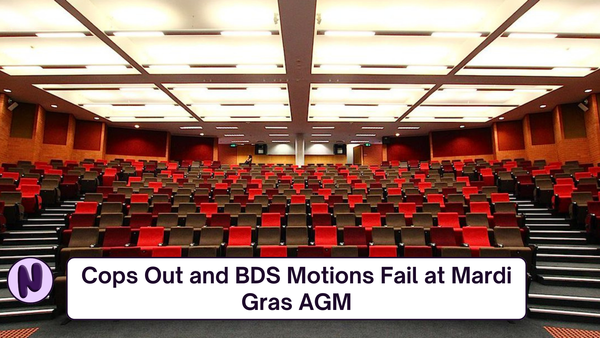Noise Introduces EDM Officers: Your Constitutionally Appointed DJs
The Noise team wants to see better music tastes and less discrimination in clubs at UNSW. Here’s how we plan to solve both problems at once.

Anyone in our digital age can curate a Spotify playlist, but many people shouldn't. Just as many people are allowed to run Arc clubs, but far fewer should be trusted to. If Arc won’t make anti-discrimination countermeasures (such as EDI officers) mandatory, the least we can do is implement the (equally important) responsibility of ensuring the aux at society events only plays certified bangers. Now that uni events are increasingly in-person, the presence of music at these events is not negligible. EDM officers are arguably more important than EDI officers, but only one is suggested by the Arc model constitution.
What's an EDI Officer?
Each Arc society is a microcosm, with its own internal power structures and politics. Although Arc itself has very little governance over the day-to-day operations of its societies, it maintains a rigid set of guidelines that must be adhered to for a club to maintain affiliation, including five mandatory executive roles: President, Secretary, Treasurer, Arc Delegate, and Grievance Officer. Additionally, a position called the Equity, Diversity & Inclusion (EDI) Officer is not mandatory, but “strongly recommended”. Arc does not restrict the creation of new roles, provided they adhere to the process of constitutional amendment.
The key purpose of an EDI officer within an Arc club is to advocate for minority groups within their club’s executive. While the president (and other execs) ensure the satisfaction of the majority of members, the EDI officer must look out for the little guys. Instead of addressing grievances after an incident occurs, the EDI officer prevents issues preemptively.
Although it is not within the Arc model constitution, many societies stipulate that an EDI officer be of a non-majority demographic themselves (culturally diverse students, students with disabilities, female-identifying students, gender diverse students, LGBTQIA+ students and indigenous students). Not including this diminishes the importance of lived experience when dealing with non-majority issues.
Furthermore, ensuring at least one member of the executive is constitutionally required to be of a minority group is a much-needed form of affirmative action. If your club cannot find one qualified member who falls into a non-majority demographic, what is the environment you are creating? How would you ensure marginalised students feel welcome, safe and advocated for when they’re not represented in the executive? They’re like condoms: if someone tries to convince you that you don’t need one, you need one.
Introducing: EDM Officers
The position of EDM (Equity Diversity and Music) officer aims to kill two birds with one stone by combining the need for a club DJ and EDI officer.
Our proposed responsibilities for EDM officer are:
- All the responsibilities for EDI officers*;
- Curating playlists for society events involving music;
- Ensuring all playlists have an appropriately thematic cover image;
- Making diss tracks against any individuals or organisations that wrong the society;
- Hiring, transporting and managing any music equipment involved with the society;
- Coordinating with any live musicians performing at society events;
- Liaising with other society’s EDM officers for music in collab events
*This includes the stipulation of being somebody who comes from a non-majority demographic (let us know in the comments if Arc should allow white students to make diss tracks).
The generous interpretation of Arc excluding EDI officers from their model constitution is that club constitutions don’t matter anyway. Who cares about executive power structures? It’s just a university society- stop being dramatic. If that’s the game they want to play, what’s the point of not having fun with it? EDM officer is just one role that we suggest you consider adding to your society’s constitution. Some other executive roles to consider are the fashion police, non-alcoholic beverages officer and chief exorcist!
EDI officers won’t end bigotry the same way EDM officers won’t end bad music tastes. What they do, however, is emphasise the importance of a proactive approach to their respective issues. The easiest way to make sure nobody says the music sucks at your event is by not having sucky music. Similarly, the easiest way to prevent grievances is by making sure there are preventative measures to protect your marginalised members. It’s never too late to add either of these roles to your club’s constitution. Whether you’re on exec or not, you deserve to be in a club that cares about your experience.
Had a problem the uni won’t do anything about? If you or anybody you know would like to share a negative experience, do not hesitate to contact us via our tipline.




